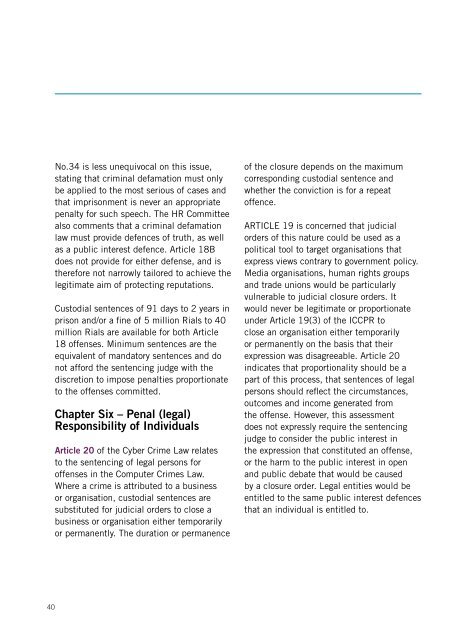Islamic Republic of Iran: Computer Crimes Law
Islamic Republic of Iran: Computer Crimes Law
Islamic Republic of Iran: Computer Crimes Law
You also want an ePaper? Increase the reach of your titles
YUMPU automatically turns print PDFs into web optimized ePapers that Google loves.
40<br />
No.34 is less unequivocal on this issue,<br />
stating that criminal defamation must only<br />
be applied to the most serious <strong>of</strong> cases and<br />
that imprisonment is never an appropriate<br />
penalty for such speech. The HR Committee<br />
also comments that a criminal defamation<br />
law must provide defences <strong>of</strong> truth, as well<br />
as a public interest defence. Article 18B<br />
does not provide for either defense, and is<br />
therefore not narrowly tailored to achieve the<br />
legitimate aim <strong>of</strong> protecting reputations.<br />
Custodial sentences <strong>of</strong> 91 days to 2 years in<br />
prison and/or a fine <strong>of</strong> 5 million Rials to 40<br />
million Rials are available for both Article<br />
18 <strong>of</strong>fenses. Minimum sentences are the<br />
equivalent <strong>of</strong> mandatory sentences and do<br />
not afford the sentencing judge with the<br />
discretion to impose penalties proportionate<br />
to the <strong>of</strong>fenses committed.<br />
Chapter Six – Penal (legal)<br />
Responsibility <strong>of</strong> Individuals<br />
Article 20 <strong>of</strong> the Cyber Crime <strong>Law</strong> relates<br />
to the sentencing <strong>of</strong> legal persons for<br />
<strong>of</strong>fenses in the <strong>Computer</strong> <strong>Crimes</strong> <strong>Law</strong>.<br />
Where a crime is attributed to a business<br />
or organisation, custodial sentences are<br />
substituted for judicial orders to close a<br />
business or organisation either temporarily<br />
or permanently. The duration or permanence<br />
<strong>of</strong> the closure depends on the maximum<br />
corresponding custodial sentence and<br />
whether the conviction is for a repeat<br />
<strong>of</strong>fence.<br />
ARTICLE 19 is concerned that judicial<br />
orders <strong>of</strong> this nature could be used as a<br />
political tool to target organisations that<br />
express views contrary to government policy.<br />
Media organisations, human rights groups<br />
and trade unions would be particularly<br />
vulnerable to judicial closure orders. It<br />
would never be legitimate or proportionate<br />
under Article 19(3) <strong>of</strong> the ICCPR to<br />
close an organisation either temporarily<br />
or permanently on the basis that their<br />
expression was disagreeable. Article 20<br />
indicates that proportionality should be a<br />
part <strong>of</strong> this process, that sentences <strong>of</strong> legal<br />
persons should reflect the circumstances,<br />
outcomes and income generated from<br />
the <strong>of</strong>fense. However, this assessment<br />
does not expressly require the sentencing<br />
judge to consider the public interest in<br />
the expression that constituted an <strong>of</strong>fense,<br />
or the harm to the public interest in open<br />
and public debate that would be caused<br />
by a closure order. Legal entities would be<br />
entitled to the same public interest defences<br />
that an individual is entitled to.


